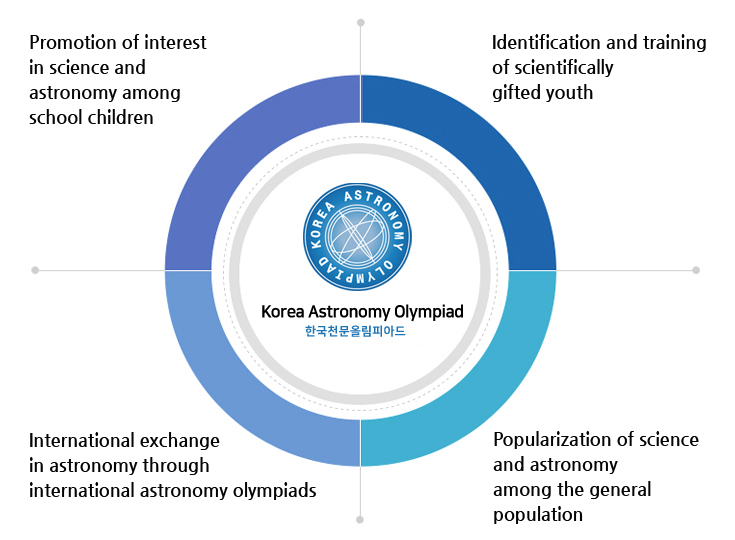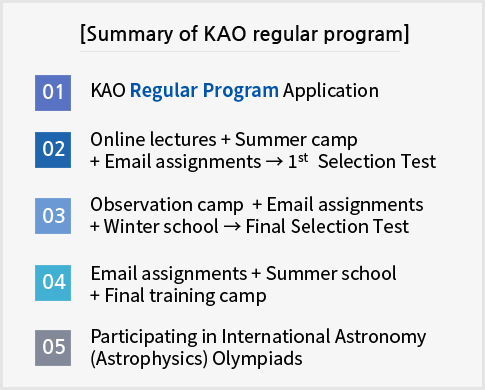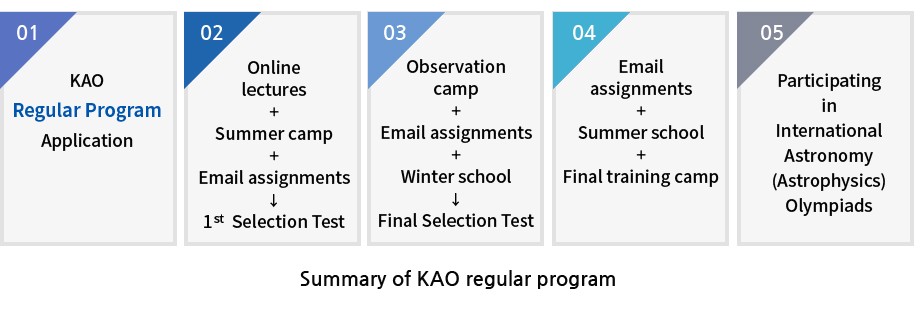Korea Astronomy Olympiad (KAO)
Korea Astronomy Olympiad (KAO)
Korea Astronomy Olympiad (KAO)
The Korea Astronomy Olympiad (KAO) is administered by the Korea Astronomy Olympiad Committee under the aegis of the Korean Astronomical Society. The Korea Astronomy Olympiad Committee, on behalf of the Korean Astronomical Society, takes the obligation of the Authorized National Representative Astronomical Organization (ANRAO) to represent the Republic of Korea in IAO, IOAA, and APAO.
On October 27, 2001, the Korean Astronomical Society and the Korea Astronomy and Space Science Institute jointly hosted the 1st Korea Astronomy Olympiad at Seoul National University in Seoul, the capital city of Korea. The following year, in October 2002, three high school students participated for the first time as observers at the 7th International Astronomy Olympiad (IAO) held in Russia. Korea has been steadily participating in the IOAA since the 1st International Astronomy and Astrophysics Olympiad (IOAA), held in Chiang Mai, Thailand, in 2007, building international friendship and raising Korea's status. The Korea Astronomy Olympiad has been supported by the government since 2003 as part of the International Science Olympiad project, which is currently being carried out by the Korea Foundation for the Advancement of Science & Creativity (KOFAC) with funding from the Promotion of Science and Technology Fund and the Lottery Fund of Korea.
- Promoting interest in the basic sciences among school children by providing them with opportunities to learn across the entire field of astronomy and to engage in astronomical observation.
- Identifying and educating the scientifically gifted children from the early stages to foster their development into astronomers who will take active roles on the global stage.
- Selecting student delegates to participate in the international astronomy olympiads, through which they can interact and connect with other young talents of the world, leading to the international friendship and cooperation.
- Popularizing science and astronomy to promote the scientific mind or the scientifically oriented attitude amongst the general population.

- Every spring, the Korean Astronomy Olympiad (KAO) opens for middle and high school students interested in astronomy across the country.
- The KAO programs are designed to foster interest and talent in astronomy among middle and high school students. There are two types of programs: the preliminary program and the regular program. The preliminary program is for students in the 1st and 2nd grades of middle school who want to learn the basics of astronomy through fun and engaging activities. There is no selection exam for this program. The regular program is for students from the 3rd grade of middle school to the 2nd grade of high school who want to deepen their knowledge and skills in astronomy. Over the summer months, the students in the regular program participate in email-based summer assignments and online lectures. Then, the first written test is held in the early fall for the students taking the regular program. The students who passed the first selection test can participate in a weekend observation class and the email-based autumn assignments. The winter school is held during the winter recess, where students learn through lectures, labs, and night sky observation classes on the foundational concepts of astronomy as well as more advanced content.
- At the beginning of the following spring, students who will participate in the international astronomy/astrophysics Olympiads are selected based on a combination of the final written test, autumn assignments, and winter school performances, including observational exams.
- From spring through summer to fall, the selected student delegates are trained via email-based assignments, a week of summer camp, and final training camps held just prior to the international astronomy and astrophysics Olympiads. From late summer to fall, student delegates participate in the international astronomy/astrophysics Olympiads.

